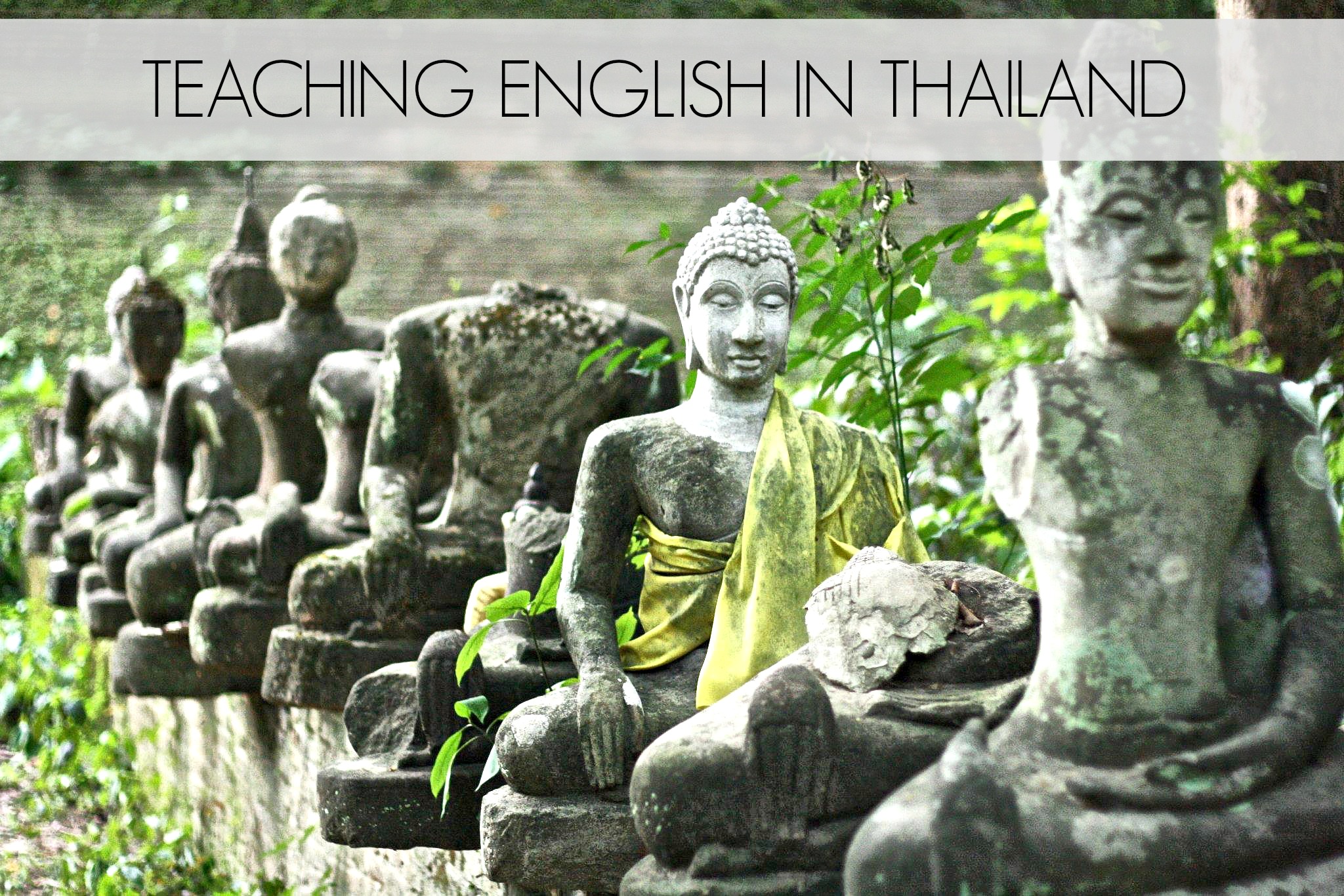In the late summer of 2010, as I began settling into a cozy new apartment in upper Manhattan–Morningside Heights, to be exact–and adorning my modest living space with posters of beautiful cities and beaches around the world, I knew deep down that, while I was excited about the prospect of spending a year in vivacious New York City, what I still craved more than anything on this earth was to escape American life altogether and experience something vastly different.
So it was decided right then and there that I would achieve that dream no matter the cost, and 14 [kickass] months later I boarded a plane to Bangkok with a one-way ticket. I began teaching English in the Northern Thai city of Chiang Mai and spent a year-and-a-half creating some of the most amazing memories of my life to date.
Since that fateful November, I’ve been fielding questions from every which way about the hows and whys of my teaching experience, so I’ve compiled a list of the questions I’m most commonly asked and my response to each. If I’ve left anything out or you have anything to add, please leave a comment below!
Teaching English in Thailand Frequently Asked Questions
1. Why did you choose Thailand?
A few main reasons: plentiful job opportunities, low cost-of-living relative to earning potential, and an amazing climate (I hate the cold). English teachers are in high demand in most parts of Asia, Thailand included; when coupled with dirt-cheap living expenses, the ability to earn a more-than-sufficient salary (enough to save, even), and balmy temps year-round, it was a clear winner.
2. Do you have a teaching degree?
Nope! I studied Nutrition at university. As such, I definitely would have felt like a fish out of water diving head-first into a teaching job, so I signed up for a TEFL certification (Teaching English as a Foreign Language) and it was well worth the investment. I gained a considerable amount of knowledge, including teaching techniques specific to language learners, and hands-on experience teaching Thai students. TEFL is an internationally recognized certification that allows you to teach almost anywhere around the world. It is typically completed in one month.
3. How did you choose your TEFL program?
This question is always a little tricky, because I have to admit I still wasn’t 100% convinced that the program I finally chose after weeks of research and deliberation (and sent a large sum of money to) wasn’t some incredibly elaborate scam. They had a nice website? And graduate testimonials? And it all seemed a little too elaborate to be a scam? In any case, it wasn’t a scam, and if you need reassurance from a real-life graduate, here it is: UniTEFL Thailand is totally legit and worth every baht.
4. Did they help you with airfare/housing/job placement?
UniTEFL does not cover the cost of your travel to Thailand, nor do they offer job placement. They offered to arrange and pay for my housing as incentive to take the course in Chiang Mai instead of Phuket, but I can’t guarantee that everyone will be offered something similar. I actually decided against any program that provided job placement because I was terrified of ending up in a tiny village in the middle of nowhere and feeling obligated to fulfill a long-term contract in a place that I wasn’t happy. I wanted the freedom to look for the type of job I wanted in the location I wanted, and it was much better that way.
5. How much does it all cost?
Most reputable TEFL courses (taken in the country you’d like to teach in) will run around $1500 USD. If your program does not provide accommodation, in Thailand you can expect to pay around $200 (maybe less if you’re willing to look around) for a monthlong stay. Hostels are very cheap, as are basic hotel rooms or studio-style apartments. Forums like thaivisa.com can be helpful too if you’re interested in shared housing with other expats. Getting to Thailand is a big expense for many of us as well, so try to plan well ahead to score low airfare (I got my one-way from Seattle to Bangkok for less than $700…but I got lucky!).
6. Does it matter where you do your TEFL certification?
Not at all! The certification I earned in Chiang Mai is valid in other parts of Thailand, other countries, other continents. TEFL courses are also offered in your home country and online. I’ve met teachers with certifications from all of these places, and they’ve all had success finding work in Thailand.
7. Do you need a TEFL to teach English?
Not necessarily. Many places will hire people as long as they are native English speakers and have a Bachelor’s degree. Having a TEFL will certainly increase your job prospects, and may even help you get a higher salary, but if you’re qualified in other ways and don’t want to pony up for the course, don’t sweat it.
8. How did you find a job afterward?
I networked. The first position I got (a mere two weeks after TEFL graduation) was largely thanks to a handful of cool expats I had made friends with, a number of which worked at the language institute that hired me. Referrals go a long way. To get a contracted position at a private school (the best way to go in Chiang Mai) was a bit more work–it’s important to show your face to the person responsible for hiring, and to show up prepared with all the necessary paperwork (research the school’s application requirements beforehand if possible). I spent several days driving around to schools armed with my applications and resume. Responding to job postings on ajarn.com is another option, but I’d still recommend going to speak to someone in person as well.
9. What is the application process like?
Every school is different! Make sure to have copies of your CV (with a not-too-smiley photo of yourself on it), any relevant certifications (TEFL, college diploma), your passport (photo page and Thai visa page), and a criminal background check (from your home state/province should be fine). You’ll be required to complete each school’s application as well, so have your work history and references handy, and a passport photo to attach. If you get an interview, you will most likely be asked to give a 20-30 minute demo lesson, so have something prepared.
10. How much money can you make as an English teacher?
The standard starting salary when teaching English at private schools in Chiang Mai is 30,000 THB (Thai baht; that’s approximately $1000 USD) per month. More money can be found in Bangkok, or so I’ve been told, but the trade-off is the lifestyle. The capital is too hectic and polluted for me. Language institutes pay hourly wages between 200-350 baht, on average, so if you’re not working a full 40 hours a week (which you probably won’t), it can be harder to make ends meet.
11. Can you teach English if it’s not your first language?
Yes! Several of my fellow TEFL graduates spoke English as their second language. Many schools do require these applicants to pass language proficiency exams, but it’s possible!
12. When is the best time of year to look for jobs?
If you want to work as a one-on-one tutor in a language institute, whenever you want! If you’re looking for the more stable income that a full-time teaching contract can provide, then plan to start applying to private schools in February and March. The Thai school year ends in March for most schools, and many of them will start interviewing and hiring new teachers immediately for their summer sessions in March/April.
13. Any other advice?
Even if you end up in a place where there are plenty of English speakers, try to learn some Thai. You’ll find that even just a little goes a long way with the locals and will help you experience the culture on a deeper level (and it’s just rude to not even try…don’t be one of those people). And don’t be one of those slacker teachers who clearly doesn’t give a shit about their job or their students. You are still expected to educate people, regardless of how lax the system might seem in comparison to what you’d see at home. Lastly, have fun with it! It won’t always be easy but I CAN guarantee that you’ll learn a lot and have some amazing experiences, and the hard parts will all be worth it.
For an even more detailed account of my experience teaching English in Thailand, check out this interview I did with Alex of the travel blog Alex in Wanderland.
Pin It!
Chok dee! (Good luck!)



